Related Research Articles
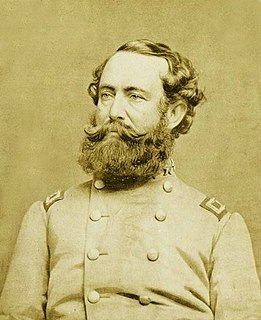
Wade Hampton III was a Confederate States of America military officer during the American Civil War and politician from South Carolina. He came from a wealthy planter family, and shortly before the war he was one of the largest slaveholders in the Southeast as well as a state legislator. During the American Civil War, he served in the Confederate cavalry, where he reached the rank of lieutenant general.

Henry Stuart Foote was a United States Senator from Mississippi and the chairman of the United States Senate Committee on Foreign Relations from 1847 to 1852. He was a Unionist Governor of Mississippi from 1852 to 1854, and an American Party supporter in California. During the American Civil War, he served in the First and Second Confederate Congresses. A practicing attorney, he published two memoirs related to the Civil War years, as well as a book on Texas prior to its annexation, and a postwar book on the legal profession and courts in the South.

General Edmund Kirby Smith was a senior officer of the Confederate States Army who commanded the Trans-Mississippi Department from 1863 to 1865. Prior to the American Civil War, Smith served as an officer of the United States Army.

Mount Olivet Cemetery is a 206-acre (83 ha) cemetery located in Nashville, Tennessee. It is located approximately two miles East of downtown Nashville, and adjacent to the Catholic Calvary Cemetery. It is open to the public during daylight hours.

George Washington Gordon was a general in the Confederate States Army during the American Civil War. After the war, he practiced law in Pulaski, Tennessee, where the Ku Klux Klan was formed. He became one of the Klan's first members. In 1867, Gordon became the Klan's first Grand Dragon for the Realm of Tennessee, and wrote its "Precept," a book describing its organization, purpose, and principles. He was also a member of the United States House of Representatives for the 10th congressional district of Tennessee.

John Lendrum Mitchell was an American politician and philanthropist from Milwaukee, Wisconsin. A Democrat, he served one term each in the United States Senate (1893–1899) and House of Representatives (1891–1893). Earlier, he was a member of the Wisconsin State Senate and a Union Army officer in the American Civil War.
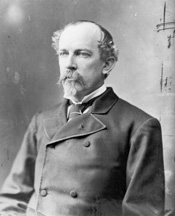
Matthew Calbraith Butler was a Confederate combatant, an American military commander and attorney and politician from South Carolina. He served as a major general in the Confederate States Army during the American Civil War, postbellum three-term United States Senator, and a major general in the United States Army during the Spanish–American War.
University of Nashville was a private university in Nashville, Tennessee. It was established in 1826 as Cumberland College. It existed as a distinct entity until 1909; operating at various times a medical school, a four-year military college, a literary arts college, and a boys preparatory school. Educational institutions in operation today that can trace their roots to the University of Nashville include Montgomery Bell Academy, an all-male preparatory school; the Vanderbilt University Medical School; Peabody College at Vanderbilt University; and the University School of Nashville, a co-educational preparatory school.

Douglas Selph Henry Jr. was an American attorney and Democratic politician. He was the longest-serving member of the Tennessee legislature. He was a member of the Tennessee Senate, representing the 21st district. He served as a state senator beginning with his election to the 87th General Assembly, prior to which he was a member of the Tennessee House of Representatives during the 79th General Assembly.

James Edwards Rains was a lawyer and colonel in the Confederate States Army during the American Civil War. He was appointed and nominated as a brigadier general on November 4, 1862, but his appointment was unconfirmed at the date of his death. He was killed while leading his brigade at the Battle of Stones River (Murfreesboro) on December 31, 1862 before the Confederate States Senate acted on his nomination.
The Western Military Institute was a preparatory school and college located first in Kentucky, then in Tennessee. It was founded in 1847 in Georgetown, Kentucky, and it later moved to Nashville, Tennessee, where it merged with Montgomery Bell Academy in 1867. The former campus is now Vanderbilt University's Peabody College. Alumni include prominent Confederate veterans and Southern politicians.

William Andrew Quarles was a Tennessee lawyer, politician, railroad executive, and a general in the Confederate States Army during the American Civil War.

John Berrien Lindsley (1822–1897) was an American Presbyterian minister and educator in Nashville, Tennessee.
Judge Jeremiah Watkins Clapp was an American lawyer, planter and politician. He owned cotton plantations in Mississippi and Arkansas, and he served as a judge in the Mississippi legislature from 1856 to 1858. An advocate of the Confederate States of America, he served in the First Confederate Congress from 1862 to 1864. During the American Civil War, he was in charge of Confederate cotton in Mississippi as well as sections of Alabama and Louisiana. After the war, he moved to Memphis, Tennessee, and he served in the Mississippi State Senate from 1878 to 1880.
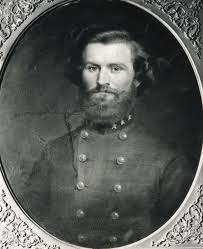
Randal William McGavock (1826–1863) was an American lawyer, Democratic politician, Southern planter, and colonel in the Confederate States Army. He served as the Mayor of Nashville, Tennessee from 1858 to 1859.
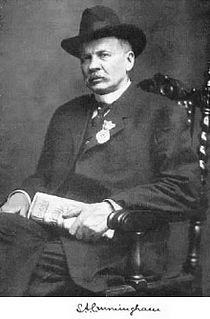
Sumner Archibald Cunningham was an American Confederate soldier and journalist. He was the editor of a short lived Confederate magazine called "Our Day" (1883-1884) published in New York. In 1893 he established the Confederate Veteran, a bimonthly magazine about veterans of the Confederate States Army until his death in 1913.
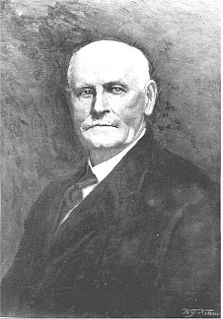
John Trotwood Moore (1858–1929) was an American journalist, writer and local historian. He was the author of many poems, short stories and novels. He served as the State Librarian and Archivist of Tennessee from 1919 to 1929. He was "an apologist for the Old South", and a proponent of lynching.

John Watson Morton was an American Confederate veteran, farmer and politician. He served as captain of artillery under General Nathan Bedford Forrest in the Confederate States Army during the American Civil War, and he was the founder of the Nashville chapter of the Ku Klux Klan after the war. He served as the Tennessee Secretary of State from 1901 to 1909.

Samuel Franklin Wilson (1845-1923) was an American Confederate veteran, politician and judge.
Edith D. Pope was an American editor. She was the second editor of the Confederate Veteran from 1914 to 1932, and the president of the Nashville No. 1 chapter of the United Daughters of the Confederacy from 1927 to 1930. She played a critical role in the promotion of the Lost Cause of the Confederacy.
References
- 1 2 3 4 5 6 7 8 9 10 Allison, John (1905). Notable Men of Tennessee: Personal and Genealogical, with portraits. Atlanta, Georgia: Southern historical Association. pp. 56–57. OCLC 2561350 – via Internet Archive.
- 1 2 Losson, Christopher (1989). Tennessee's Forgotten Warriors: Frank Cheatham and His Confederate Division . Knoxville, Tennessee: University of Tennessee Press. p. 276. ISBN 9780870496158. OCLC 19742044.
Hampton J. Cheney.
- 1 2 3 "Tennessee State Museum: Cheney, Hampton J." Tennessee Portrait Project. National Society of Colonial Dames of America in Tennessee. Retrieved September 25, 2016.